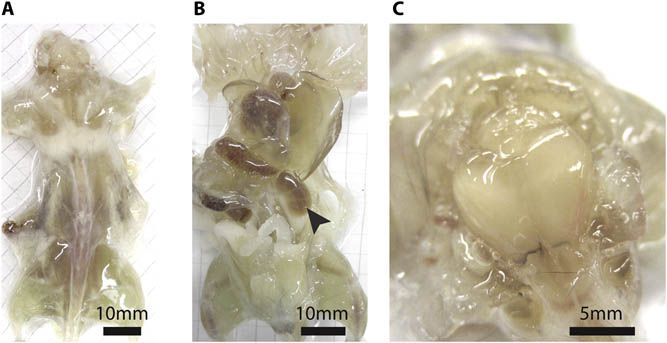
Move over, spotted mice. According to a study published Thursday in the journal Cell, scientists have developed a chemical treatment that turns lab mice transparent. Researchers at the California Institute of Technology will use them to study the way disease flows through the body and, one day, to analyze patients' biopsy samples.
The study detailed that the mice are see-through because of chemicals pumped through their blood vessels, the spinal cord and passages in their brains. First, scientists euthanize the mice and remove their skins. Then they inject a detergent through the mouse's circulatory system, which results in (literally) clear internal organs.
The chemicals form a mesh that helps hold tissue together and clears the fats blocking light from tissues; it makes the rodents look like little blocks of cold Jell-O. It takes roughly two days to make a mouse's organs transparent and one week more to make a mouse fully see-through. In total, the transparent rats take about two weeks to create, Viviana Gradinaru, senior author of the study and assistant professor of biology at the California Institute of Technology, said in an interview with the Associated Press.
Typically scientists study mouse organs by dissecting them into slices, but this method is inaccurate since the slices can come out crooked. In April, scientists at Stanford made a mouse brain fully transparent by treating it with formaldehyde to stop chemical reactions and then soaked it in acrylamide, the transparent gel that latches on to proteins. Gradinaru stated that the next step is charting the nervous system, which, if successful, might help researcher improve treatment for diseases including epilepsy and Parkinson's.
The transparent mice are also part of a long-term Stanford project that would make the entire human brain see-through. Clear brains would certainly revolutionize neuroscience efforts but likely wouldn't shed further light on how to read minds. People are still elusive as ever.
Uncommon Knowledge
Newsweek is committed to challenging conventional wisdom and finding connections in the search for common ground.
Newsweek is committed to challenging conventional wisdom and finding connections in the search for common ground.
About the writer
Paula Mejia is a reporter and culture writer. Her work has appeared in The Guardian, Rolling Stone, The A.V. Club, Pitchfork, ... Read more





